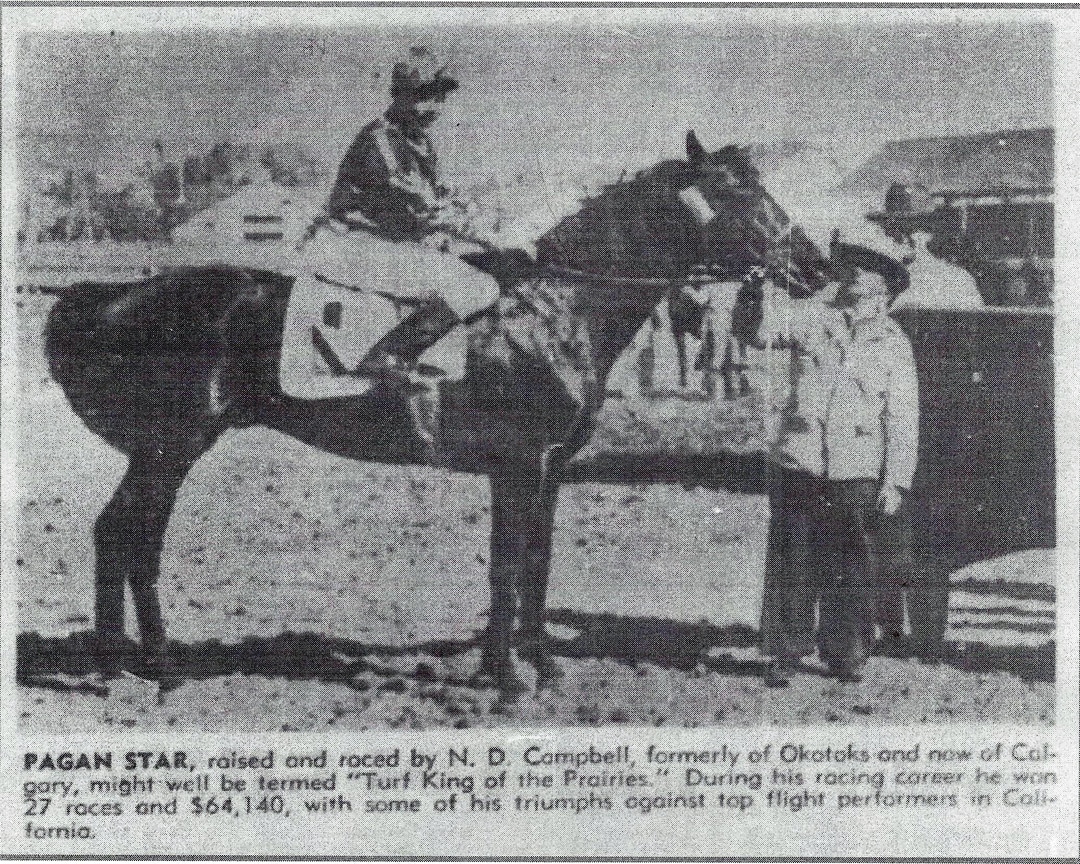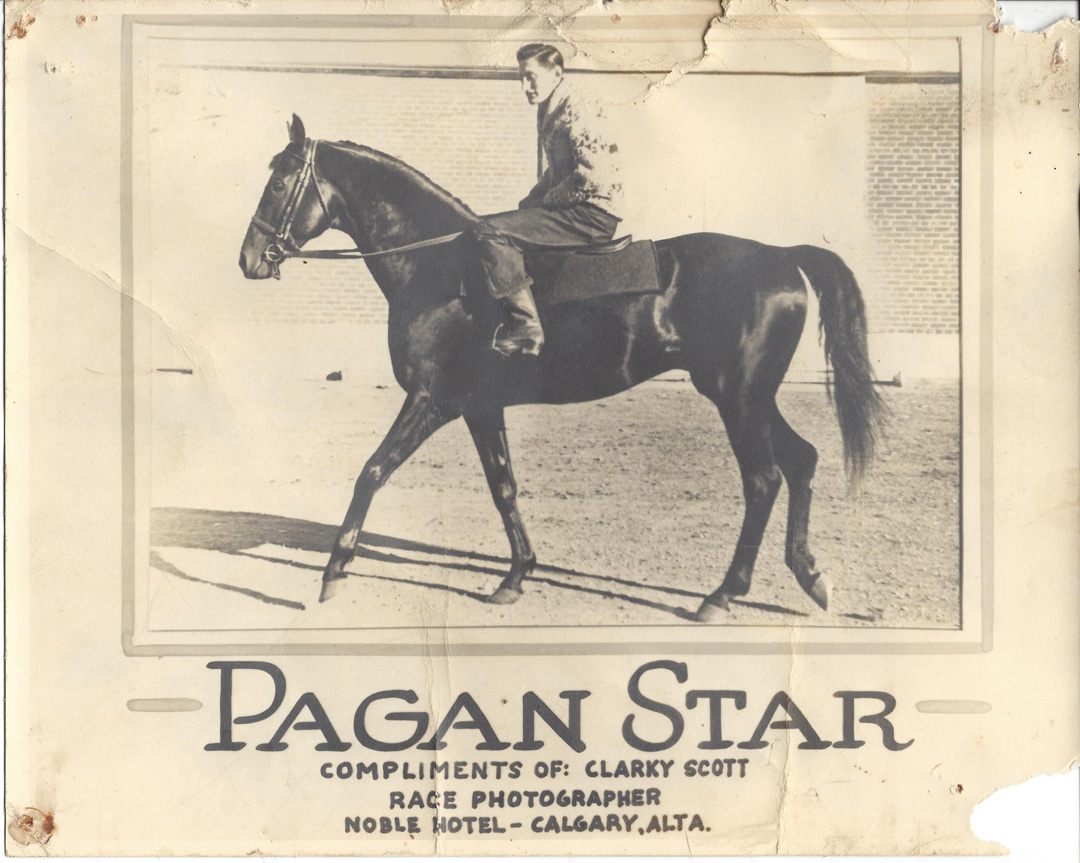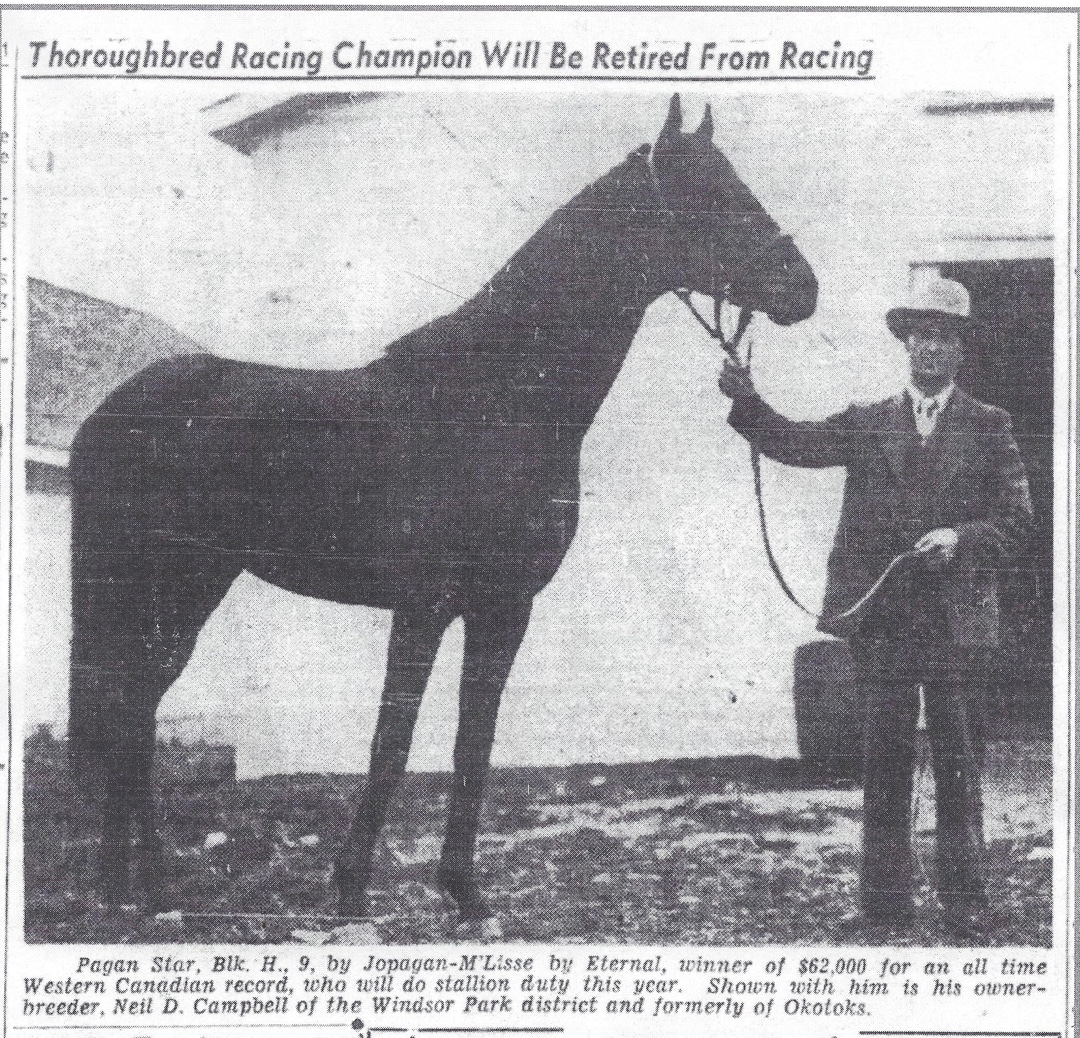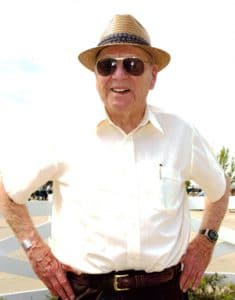
Pagan Star "Turf King of the Prairies"
by Bob Gates
Horses come and horses go, but have you ever noticed that the ones we think of most fondly are almost always from another era. Pagan Star is one such horse. So, who was Pagan Star and why are we talking about him?
It wasn't all that long ago that I couldn't have answered this question. Downs patriarch, the late Bert Blake "introduced" me to Pagan Star in 2010. Actually, he presented me with a picture of Pagan Star (see below).

Pagan Star. On the tack room wall.
The picture had character and had seen better days. It was discoloured, ripped with corners missing, and let's not leave out the thumb tack holes. Blake explained that he had it on his tack room wall for as long as he could remember, and he wanted me to have it. I was thrilled, if for no other reason other than it was important enough for him to give it to me, but let's be clear, I didn't know Pagan Star from Adam.
Mr. Blake told me the jockey was Eddie Johnson, whose brother Roy trained Whistling Sea, the first western-bred to win the Queen's Plate. However, I have no memory of him saying anything special about the horse.
I set the picture aside and made a note on my things-to-do list (which is also a place where things "go to die") to check out the horse. Well as often happens, one thing led to another, the picture got filed away and I forgot all about Pagan Star, until recently.
As it turns out, Pagan Star was a good one and it's no wonder how his photo came to be on Blake's wall. The "Turf King of the Prairies" won 27 races and garnered $64,140 in purses. He raced against the best on the old Prairie Racing Circuit and along the U.S. Pacific Coast in Washington and California, making himself enough money along the way to become Western Canada's richest money winner.

Pagan Star and Neil D. Campbell
Pagan Star was bred, owned and trained by Alberta farmer/horseman Neil D. Campbell. Star was a black-as-night son of Jopagan out of M'Lisse by External. He was lightly raced as a 2-year-old, making only three starts and registering but one lonely second place finish in 1943. It was the only racing season in his 9-year career that he failed to post a victory.
However, he was a greatly improved 3-year-old, winning 4 of his 12 starts, including the 1944 Alberta Derby. The fleet-footed pride of Neil Campbell had tipped his hand in the Alberta classic when he "tow-roped" the 6-horse field winning as he pleased.
He came east to Winnipeg that year for the Canadian Derby, which was held at old Polo Park racetrack, but contracted shipping fever. Campbell thought he had recovered enough to compete and ran him in the Derby, but Star was one sick horse and finished last in the field of six, more than 20 lengths back.
From 1946 to 1950, Star went postward on the prairies 10 times, compiling a record of 9 wins and a second. The majority of his other starts took place along the Pacific Coast. Star was routinely top-weighted, carrying weights of 127 to as much as 131 lbs. To ensure that every race with Campbell's sleek black colt was a fair contest, presiding stewards and racing secretaries assigned Pagan Star the heaviest imposts any horse could be called upon to bare.
The 1948 Chinook Handicap saw him carry 124 lbs. He was never pressed and won the 7-furlong event by 7 lengths, missing the track record by 2/5 seconds. In his next outing, the Twilight Handicap, going 6 ½-furlongs he carried 128 lbs spotting his main competitor 8 lbs. and lost by a nose. Two days later in the Teeworth Plate, he again carried 128 lbs. and breezed to a 6-length victory.
Whenever Pagan Star came to Winnipeg he made headlines. For the 1950 Western Canada Handicap, the Winnipeg Tribune headline read "Pagan Star, West's Top Winner, Will Run Here." He was a beaten favourite in the Handicap, finishing third.
Pagan Star was retired to stud duties at the end of the 1950 racing season, but when spring training rolled around in April 1951 Star didn’t take kindly to being left in his stall while others prepared for the upcoming season. Campbell decided to bring him back to the races, even though he was in the middle of his first breeding season.
Sure, Star was a 10-year-old, but a fire still burned in the stallion's belly. So 1951 was the big guy's last poke at the cat. He had lost a step or two, but still managed to win two of his eight starts and add to his record earnings. Campbell knew it was the end of the road for the aging stallion and returned Star to the barn to resume his stud duties.
Even in his final appearance at Polo Park in the 1951 edition of the Western Canada Handicap, the faltering 10-year-old was top weighted at 120 lbs. spotting the race winner a full 15 lbs. Once again, the betting public made him the favourite, but as was so often the case at Polo Park he finished up the track.
Pagan Star was almost invincible during the mid-1940s and he performed well against some of the best horses in Washington and California. From 1943 to 1951 Pagan Star scored but one major victory in Winnipeg. Polo Park was the scene of his win in the 20th running of the Whittier Park Handicap in 1945.

A. E. "Bert" Blake
No one ever figured out why, but the racing surface at Polo Park never brought out the best in Pagan Star. Winnipeg's west end track did what a 130 lbs. impost couldn't do. It brought the mighty Pagan Star, Western Canada's all-time leading money earner from the early 1950s to his knees.
I couldn't say for sure, but I suspect Pagan Star was long gone when Neil Daniel Campbell died on April 10, 1978 at the age of 80. It's sad how we tend to lose track of our four-legged athletes when their time is done. Pagan Star was a horse that looked and acted like a champion and had the record to back it up.
This Monday, June 29th would have been Mr. Blake's 101st birthday. I miss him! Somehow it just felt right to tell the story of Pagan Star, who spent nine years terrorizing his foes and another 5 decades pinned to the tack room wall of…
Albert Edward "Bert" Blake.


